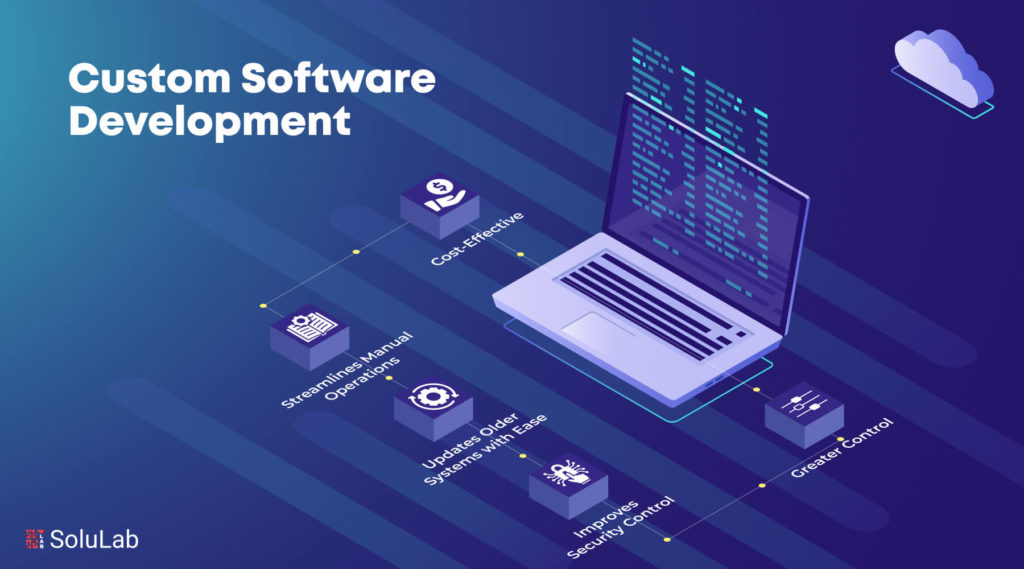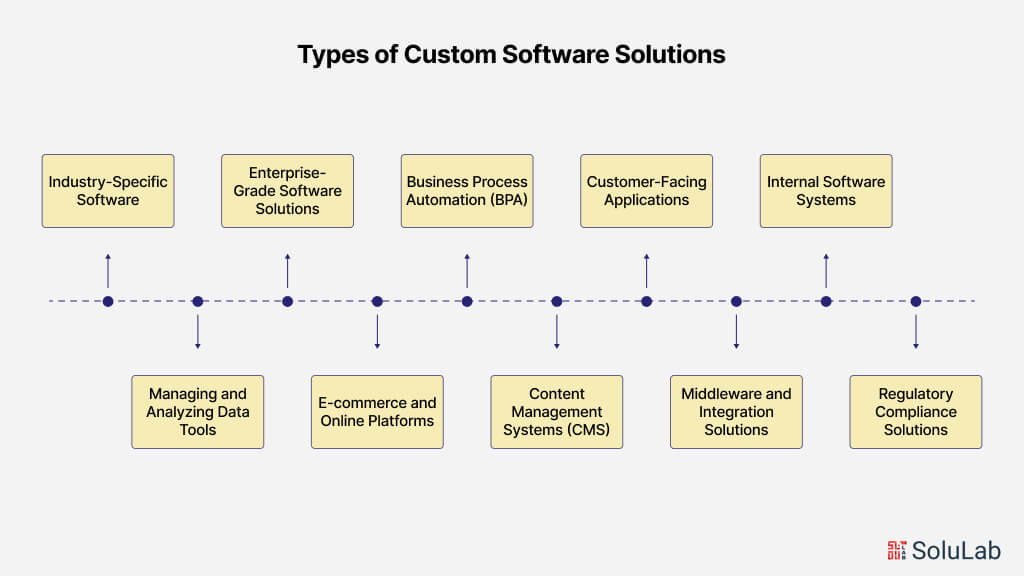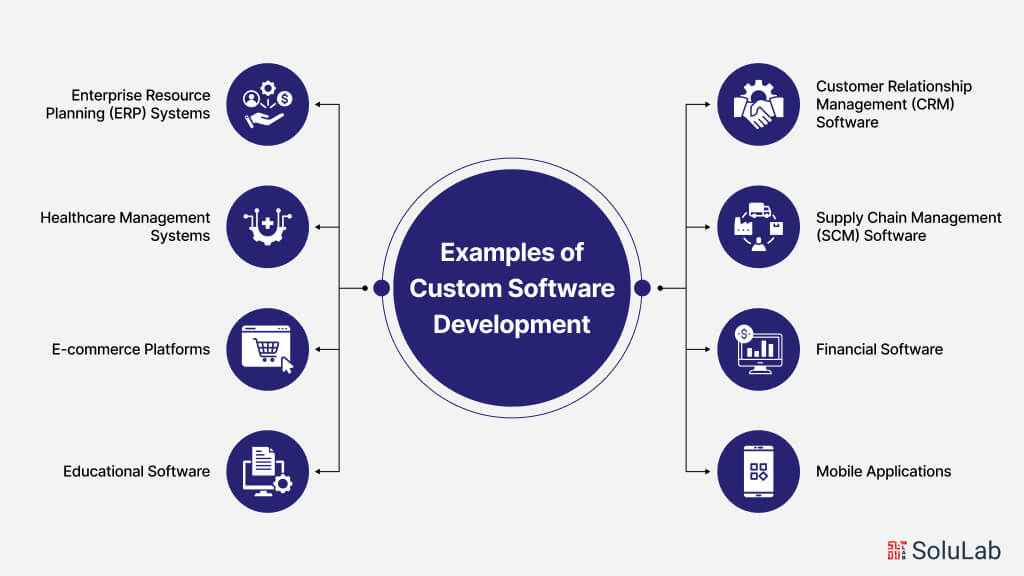
It’s evident that custom solutions have grown more and more crucial for companies looking for ways to remain in line as the global custom software development market keeps growing. Statista ventures revenues to reach USD 179.90 billion in 2024 and a projected annual growth rate (CAGR 2024-2028) of 6.87%, leading to a market volume of USD 234.70 billion by 2028. Custom apps provide firms with the adaptability to adjust to changing client requirements and technical changes, allowing them to maximize the effectiveness of their digital infrastructure.
Planning, designing, developing, and deploying digital solutions that are appropriate for a certain set of activities, users, and organizations are all crucial steps in the process of producing customized software. Custom software development is essential for improving customer experiences, optimizing processes, and giving firms an advantage in the marketplace, even in addition to industry-specific solutions. Identifying and resolving client issues and forecasting future requests, enables businesses to stay ahead of their respective sectors.
In this blog, we will discuss the reasons for the rise of custom software product development as a crucial element of today’s business environment, highlighting its numerous benefits and the revolutionary effects custom software development business has on enterprises in a variety of industries.
What is Custom Software Development?
Applications or programs that are specially created to satisfy the exact demands and specifications of a certain company or user are referred to as custom software. This customized software is created from beginning to end to meet particular demands and difficulties, either by an internal team or by an outside vendor. Commercial off-the-shelf software (COTS) is meant to solve common issues within an industry, but it is not intended for a wider audience. In contrast, custom software takes a personalized approach, making sure that every feature of the program is in line with the goals, workflows, and preferences of the business. This custom applications development gives businesses a competitive advantage and the adaptability to change as the market demands them.
What Does it Mean to Design Customized Software?
Developing custom software is a multifaceted process that starts with determining a particular business requirement, continues with creating and building specialized technological solutions to meet that requirement, and ends with smoothly integrating those solutions into the current operating framework. This goes beyond simply putting the software into place once; it also entails constantly developing and enhancing it to meet the evolving goals and objectives of the business, with the primary objective being to produce and increase revenue over time.
The customization concept is the foundation of custom software development. This custom business software development indicates that the software has been painstakingly designed to fit the particular audience, dynamics, and goals of a given company.
Custom software development services are particularly made to meet the demands of the business and its target market, whether it is designing a mobile application for direct user engagement or establishing a backend system for the marketing or sales staff. This custom development software system guarantees that the software not only blends in seamlessly with the company’s current procedures but also increases its overall efficacy and efficiency in accomplishing its strategic objectives.
Difference Between Custom Software and Off-the-Shelf Software
The debate over whether to produce or buy software continues to impact businesses searching for answers. Installing off-the-shelf software on a computer or gadget makes it immediately functional. Custom software, on the other hand, is created and tailored to fulfill particular needs. Regarding functionality, usability, and performance, they are not the same. The following are the main variations between the shelf vs custom software:
1. Goal and Personalization
Custom software is created with the needs of a particular company in mind, offering a customized solution that complements its own goals and procedures.
Software that is available off the shelf is made with a larger audience in mind, providing a general solution that might not completely meet the unique requirements of every given company.
2. Compatibility and Integration
To ensure smooth functioning and data flow, custom software may be created to connect smoothly with an organization’s current systems and procedures. It could take more time and money to make off-the-shelf software compatible with other systems, and integration might not go as smoothly.
3. Flexibility and Scalability
Scalability may be taken into consideration while creating custom software, making it simple to expand and modify as the company’s demands change as it expands. The scalability and adaptability of off-the-shelf software may be limited, making it difficult to modify to meet changing company needs.
4. Investment and Cost
Although the cost to develop a software that is customized usually is higher, because of its customized fit and flexibility, it may end up being more affordable in the long term.
Although off-the-shelf software frequently has a lower initial cost, upgrades, customization, and licensing costs may result in additional costs.
5. Developing and Deploying Time
Because custom software development and deployment entail creating a solution from scratch based on particular needs, it may take longer.
Software that is already on the market may be used right away; all that is needed is some time for installation and configuration.
6. Reliance on the Software Vendor
Custom software development businesses are less dependent on the software vendor and have greater control over the development process and future revisions.
Customers who purchase off-the-shelf software could be more reliant on the vendor for upgrades, customer service, and new features.
Read Also: Guide to Generative AI CRM Systems
Types of Custom Software Solutions

Custom software solutions are essential for organizations to stay above the curve and manage the intricacies of their respective sectors. These custom software development consulting solutions may be roughly divided into three categories: industry-specific solutions, mobile apps, and enterprise applications. Each of these categories serves a different function and has a special benefit.
- Industry-Specific Software: Software customized to satisfy the special needs of a given sector, such as healthcare, education, finance, manufacturing, or retail, is referred to as industry-specific software. These solutions frequently include compliance rules and features unique to the sector.
- Enterprise-Grade Software Solutions: Comprehensive software solutions, such as supply chain management (SCM), customer relationship management (CRM), enterprise resource planning (ERP), and business intelligence (BI) systems, are examples of enterprise-grade software solutions. These solutions are designed to assist with the essential operations of major enterprises.
- Business Process Automation (BPA): Customized software designed to eliminate human labor, increase productivity, and boost efficiency by automating particular business processes. Project management software, document management systems, and process automation are a few examples.
- Customer-Facing Applications: Software programs created to improve user experience and involvement; examples include personalized mobile applications, online portals, self-service platforms, and online reservation systems.
- Internal Software Systems: Customized software programs designed to optimize internal processes and workflows inside a company. Examples include collaboration tools, staff scheduling software, inventory management software, and human resources management systems.
- Managing and Analyzing Data Tools: Software programs designed to gather, examine, and present data in order to provide insights and aid in decision-making. Data warehousing solutions, bespoke reporting systems, business intelligence (BI), and analytics tools are all included in this category.
- E-commerce and Online Platforms: Online firms may manage their e-commerce operations using custom software that includes order fulfillment, inventory management, online storefronts, payment processing systems, and Customer Relationship Management (CRM) platforms.
- Content Management Systems (CMS): Websites, blogs, and online stores may all be created, managed, and published by businesses using content management systems (CMS), which are software platforms. Features for content production, publication, and dissemination may be customized using CMS systems.
- Middleware and Integration Solutions: Custom software made to make it easier for different databases, apps, and systems inside a company to integrate. These solutions facilitate the sharing of data, automate processes, and guarantee system compatibility.
- Regulatory Compliance Solutions: Software specifically designed to assist companies in adhering to industry norms, laws, and regulations. Regulatory reporting platforms, audit monitoring tools, and compliance management systems are a few examples of these solutions.
Custom Software Development Applications in Various Industries
These applications of custom development software highlight the versatility and promise of custom software product development across a range of sectors, allowing companies to innovate, streamline processes, and provide outstanding value to clients.
Healthcare
Electronic Health Records (EHR) systems for patient data management, telemedicine applications for remote consultations, healthcare analytics applications for data-driven decision-making, patient involvement apps for encouraging health awareness and treatment plan adherence, etc. are examples of custom software used in the healthcare industry. These solutions can strengthen data security, expedite administrative procedures, improve patient care, and ease communication between patients and doctors.
Related: AI Agents in Healthcare
Finance
Custom software can include things like risk management tools, banking applications made to meet unique client demands, financial planning platforms for individualized investment plans, automated trading systems, and more in the finance sector. Financial institutions may benefit from these apps by managing investments, reducing risks, offering individualized banking services, and empowering clients to make wise financial decisions.
Retail
In the retail industry, software custom development can include developing point-of-sale (POS) systems for simplified transactions, systems for inventory management for effective stock control, CRM tools to promote participation and loyalty, and e-commerce platforms with customized purchasing experiences. Retailers can increase sales growth, boost customer interactions, streamline operations, and improve the entire shopping experience with the aid of these technologies.
Check Blog Post: AI Agents in Retail and E-Commerce
Manufacturing
Custom software may be used in manufacturing to create supply chain management systems, applications for quality control, tools for scheduling and organizing production, predictive maintenance programs to prevent equipment failures, and more. These solutions have the potential to save custom software development costs and boost productivity by streamlining production procedures, improving supplier and partner collaboration, guaranteeing product quality, and minimizing downtime.
Education
Learning Management Systems (LMS) for online instructional delivery, student information systems for efficiency in administration, engaging educational applications for improved learning, learning analytics platforms for monitoring student performance and outcomes, and more are examples of custom software in the education sector. These technologies may assist data-driven decision-making in education, enable remote learning, simplify school administration, and offer engaging and customized learning experiences.
Real Estate
Property management systems for effective property processes, CRM tools to handle client relationships, virtual tour platforms for demonstrating properties, real estate analytics solutions for market analysis and making investment choices, and other software can all be considered custom software in the real estate industry. Real estate agents may benefit from these technologies by increasing customer interaction, streamlining processes, promoting properties more effectively, and making wise investment choices.
Logistics
Supply chain management solutions for complete visibility, fleet administration systems for vehicle tracking and route optimization, warehouse management systems for inventory control, logistics analytics systems for operational insights and performance enhancement, etc. are some examples of the custom software development used in the logistics industry. Logistics organizations may use these apps to lower costs, increase customer satisfaction, streamline operations, and make data-driven choices.
Tourism and Travel
Booking and reservation applications for easy travel planning, itinerary management programs for tailored trip organization, customer feedback platforms for better service quality, and travel analytics systems for market insights and trend analysis are just a few examples of custom software used in the travel and tourism sector. These solutions may improve clients’ travel experiences, simplify operations for travel agencies, offer insightful information for bettering services, and assist the travel industry’s use of data to inform decision-making.
E-Commerce
Custom software in e-commerce might include order administration and fulfillment systems for effective processing, online marketplace platforms that offer tailored purchasing experiences, e-commerce analytics tools for comprehending consumer behavior and preferences, etc. These technologies may help e-commerce companies increase sales, enhance consumer interaction, streamline operations, and make wise decisions based on data insights.
Benefits of Custom Software Development
Since custom business software development offers specific solutions for certain challenges, it is crucial for optimizing many business processes. Custom software offers unmatched flexibility and effectiveness in meeting specific objectives, from optimizing customer experiences to simplifying procedures. Nonetheless, the process of developing bespoke software is closely linked to the significance of custom software development business. Research from a number of prestigious organizations emphasizes the importance of bespoke software development. The following are some important findings:
- According to a Software Advice poll, 86% of corporate decision-makers believe that developing custom software is essential to the success of their organization.
- According to a Gartner analysis, the average return on investment (ROI) for custom software development may be 15 times better than that of off-the-shelf software, which is just 3 times as high.
- According to IBM research, developing custom software may save operating expenses by 30%, revenue by 20%, and customer satisfaction by 40%.
- According to SOLTECH, companies may gain a competitive edge through differentiation, creativity, and efficiency improvements that come with custom software development.
Beyond just providing basic functionality, customized software development offers organizations a full solution that is tailored to their specific demands and objectives. Here are a few significant advantages of using custom application development software:
- Meets Particular Commercial Requirements: Customized software development services are created especially to meet the unique needs and problems of an organization. They may be customized to match the organization’s workflow, preferences, and goals, in contrast to off-the-shelf solutions, guaranteeing a perfect fit that grows with the company.
- Streamlines Manual Operations: Custom software drastically cuts down on the time and effort needed to do common tasks by automating and optimizing manual procedures. Because of the increased efficiency brought about by this automation, staff members are free to concentrate on other crucial areas of the company, such as strategic planning and innovation.
- Cost-Effective: Custom software may require a larger initial expenditure, but over time, it turns out to be economical. Companies may save themselves the continuous costs of buying, licensing, and maintaining off-the-shelf products that might not be perfect for their purposes. Scalability may be considered while developing custom software, which removes the requirement for several unrelated systems.
- Improves Security Control: Enhanced security features catered to the unique requirements of the company are provided by custom software. Because of their distinctive design, which takes more work to compromise than commonly used off-the-shelf software, they are less likely to be targeted by hackers. To better safeguard their data, firms can also use advanced security features like access limits and encryption.
- Updates Older Systems with Ease: Businesses may keep up to date with technology by upgrading outdated systems with bespoke software. In a digital world that is changing quickly, custom development makes it possible to seamlessly integrate new features and technologies into current systems, preserving their effectiveness and relevance.
- Greater Control: Companies own total control over the design, development, and maintenance of their own software. With this degree of control, the software is guaranteed to stay in step with the evolving demands and goals of the company, offering a customized solution that is unmatched by off-the-shelf software.
Custom software development, then, provides an extensive array of advantages that may greatly improve a company’s security, competitiveness, and operations. Businesses can guarantee that their custom software development consulting precisely matches their goals by investing in custom solutions, giving them a strong platform for expansion and success in the digital era.
Examples of Custom Software Development

Custom software development encompasses a wide range of solutions tailored to meet specific business needs. Here are some notable examples illustrating how top custom software development companies deliver bespoke solutions:
1. Enterprise Resource Planning (ERP) Systems: Custom ERP systems streamline business processes by integrating various functions like finance, HR, supply chain, and inventory management. Top custom software development companies create ERP solutions that are tailored to the unique requirements of each business, enhancing efficiency and decision-making.
2. Customer Relationship Management (CRM) Software: Custom CRMs help businesses manage their interactions with current and potential customers. Unlike off-the-shelf CRMs, custom solutions can be designed to include specific features such as advanced analytics, personalized marketing, and seamless integration with other business systems.
3. E-commerce Platforms: Leading custom software development firms develop e-commerce platforms that provide businesses with unique features like custom payment gateways, advanced product search capabilities, personalized user experiences, and integration with third-party services. These platforms are designed to meet the specific needs of online retailers, enhancing customer engagement and sales.
4. Healthcare Management Systems: Custom software in healthcare includes patient management systems, electronic health records (EHR), and telemedicine platforms. These systems are tailored to comply with industry regulations and cater to the specific workflows of healthcare providers, improving patient care and operational efficiency.
5. Financial Software: Custom financial software solutions include trading platforms, banking applications, and financial analytics tools. Top custom software development companies ensure these solutions meet stringent security requirements and provide features like real-time data processing, risk management, and compliance with financial regulations.
6. Educational Software: Custom educational software includes learning management systems (LMS), e-learning platforms, and virtual classrooms. These solutions are tailored to provide unique features like interactive content, personalized learning paths, and integration with other educational tools, enhancing the learning experience for students and educators.
7. Supply Chain Management (SCM) Software: Custom SCM solutions help businesses manage and optimize their supply chain operations. Top custom software development companies create SCM systems that offer features like real-time inventory tracking, demand forecasting, and supplier management, tailored to the specific needs of each business.
8. Mobile Applications: Custom mobile apps are developed to provide unique functionalities and a personalized user experience. These apps can range from enterprise mobility solutions to consumer-facing applications, designed to meet the specific requirements of the target audience and leverage the latest mobile technologies.
These examples of custom software development not only improve operational efficiency but also provide a competitive edge in the market.
Best Practices to Implement in Custom Software Development
Building custom software requires a strategic approach to ensure it effectively meets specific business needs. Here are some best practices for successful custom software development:
- Conduct a Cost-Benefit Analysis: Evaluate the financial viability by comparing the projected benefits against the estimated costs of the custom software.
- Assess Existing Solutions: Before opting for custom development, investigate if any commercial off-the-shelf solutions can fulfill your requirements.
- Define Clear Requirements: From the outset, understand the problem the software will address and how it will provide a unique solution to your business challenges.
- Select the Right Development Partner: Carefully choose a custom software development partner by evaluating their testimonials, case studies, and expertise.
- Choose an Appropriate Outsourcing Model: Decide on the most suitable outsourcing model for your project, whether it be nearshoring, onshoring, offshoring, insourcing, or homeshoring.
- Consider Staff Augmentation: If you have an existing team but need temporary additional resources, staff augmentation can be a practical option.
- Decide Early on Hosting: Make early decisions on where the custom software will be hosted, whether on-premise or on a public cloud like Amazon AWS, Azure, or GCP.
- Maintain Thorough Documentation: Keep detailed documentation throughout the development process to aid in future maintenance and updates.
- Address Training Requirements: Ensure all users receive adequate training to use the software effectively.
- Use the Latest Technology Stack: Opt for a technology stack that ensures sustainability and scalability for your custom software.
- Implement a Proof of Concept (PoC): For new and untested ideas, develop a PoC to validate the concept before proceeding with full-scale development.
- Build a Minimum Viable Product (MVP): Consider launching an MVP before the complete product to gather user feedback and make necessary adjustments.
- Develop a Mobile App: If relevant, create a mobile app version of your custom software to cater to mobile users and enhance accessibility.
By adhering to these best software development custom practices, businesses can ensure their custom software development projects are well-planned, cost-effective, and aligned with their strategic objectives.
Conclusion
Custom software development is a crucial process for businesses seeking to tailor solutions to their unique needs and gain a competitive edge. Unlike off-the-shelf software, custom solutions offer unparalleled flexibility, allowing companies to implement features and functionalities specific to their operational requirements. This approach not only enhances efficiency and productivity but also ensures that the software can evolve with the business, accommodating growth and changing needs.
Despite its many advantages, custom software development comes with its own set of challenges, such as high initial costs, longer development times, and the need for continuous maintenance and updates. However, SoluLab, a leading custom software development company, is well-equipped to address these challenges. Our team of experts leverages the latest technologies and proven methodologies to deliver cost-effective, scalable, and robust custom software solutions. With a commitment to quality and client satisfaction, SoluLab ensures that your software not only meets but exceeds your expectations. Ready to transform your business with custom software? Contact Us today to discuss your project and discover how we can help you achieve your goals.
FAQs
1. What is custom software development?
Custom software development involves creating software applications tailored to the specific needs and requirements of an individual business or organization. Unlike off-the-shelf software, which is designed for a broad audience, custom software is built to address particular challenges, workflows, and objectives unique to the company it serves.
2. What are the benefits of custom software over off-the-shelf solutions?
Custom software offers several advantages over off-the-shelf solutions, including greater flexibility, scalability, and personalization. It can be tailored to meet the exact needs of a business, integrate seamlessly with existing systems, and adapt as the business grows and changes. This results in improved efficiency, enhanced productivity, and a better overall user experience.
3. How long does it take to develop custom software?
The timeline for developing custom software varies based on the complexity of the project, the specific features required, and the development methodology used. On average, a custom software project can take anywhere from a few months to over a year to complete. Working with an experienced development partner, like SoluLab, can help ensure a more accurate timeline and efficient development process.
4. What are the common challenges in custom software development?
Common challenges in custom software development include high initial costs, longer development timelines, and the need for ongoing maintenance and updates. Additionally, clearly defining requirements, managing changes during the development process, and ensuring user adoption can be challenging. Partnering with a reputable development company can help mitigate these challenges.
5. How can SoluLab help with custom software development?
SoluLab specializes in delivering tailored software solutions that address the unique needs of businesses. Our team of experts employs advanced technologies and proven methodologies to create scalable, robust, and cost-effective custom software. We handle everything from initial consultation and requirement gathering to development, deployment, and ongoing support, ensuring your software project is a success. Contact Us today to learn more about how we can help you with your custom software development needs.





